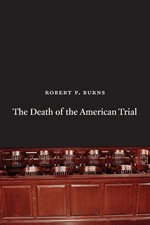
The Death of the American Trial
As a little girl watching Perry Mason re-runs, Sonia Sotomayor could not have imagined the scrutiny that would one day be leveled at her entire judicial record. Yet even though she is on track to become one of a very elite group of nine, she is by no means alone in her love of a good legal thriller. Stories about lawyers and the law are a part of our entertainment culture from Perry Mason and the endless re-runs of Law and Order (duh, duh) to the novels of John Grisham and Scott Turow. And who can forget Jack Nicholson’s iconic, dramatic “you can’t handle the truth!” in the court scene from A Few Good Men?

However, despite popular perceptions of the trial process, this most central feature of the American legal system is actually slowly disappearing. In his new book The Death of the American Trial, Northwestern Law Professor Robert Burns examines the decline of trial law in both civil and criminal courts. In 2002, a mere 2% of federal civil suits were decided in trial while 40 years ago that number was several times higher at 12%. The statistics for criminal cases follow the same trend: 3%, down from 9% in the 1970s. High-profile lawsuits with a controversial verdict—the OJ Simpson trial, for example—may have affected social perceptions about the value of decisions delivered by jury, but as Burns demonstrates in his book, the trial is actually a fundamental component of American democracy. How to balance realism and idealism, practicality and justice, adherence to principles but a keen understanding of the significance of context? For a century, this balance has been reflected in the trial, the link between the ordinary citizens who make up the jury pool and the select few who are ultimately considered for Supreme Court appointments.
Jury duty summons aren’t universally welcomed, but as a federal judge quoted by Burns reminds us, “the jury is the canary in the mineshaft; if it goes, if our people lose their inherited right to do justice in court, other democratic institutions will lose breath too.” We live in a world, especially recently, in which the morning news serves as a constant reminder that democratic elections and confidence in the just arbitration of legal complaints is not something that can ever be taken for granted. Closer to home, our elected legislators are in the process of sifting through a career’s worth of legal decisions as an application for membership on the highest court in the land. The 20th century has left us with a legacy of famous trials and Supreme Court verdicts that have shaped our history as a country. As we move into the 21st century with even greater challenges ahead, let us hope that this part of our legal system does not come to exist only in television reruns.
